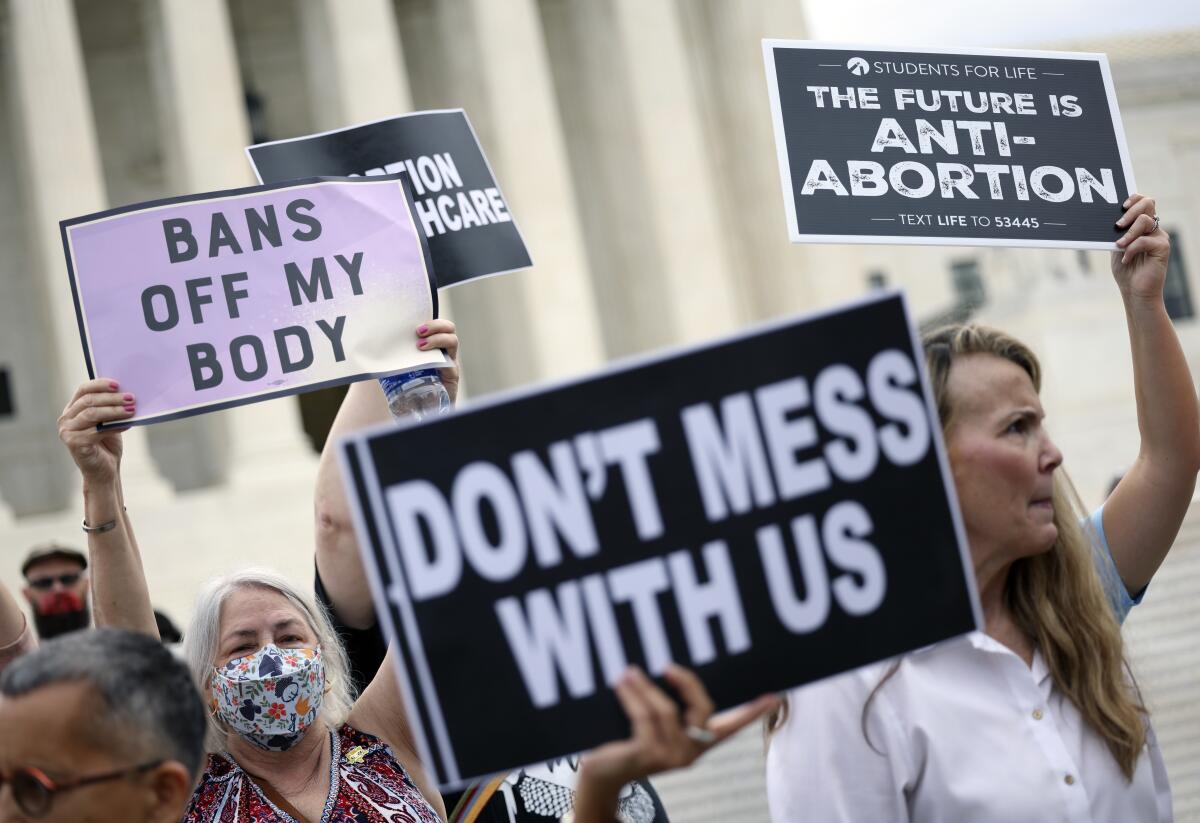Column: A Supreme Court ruling overturning Roe v. Wade would be a jolt to midterm elections

A decision that would take away the constitutional right to abortion could put Republicans in swing districts on the spot
Gov. Gavin Newsom crushed the attempt to recall him from office in large part because the leading candidate to replace him was nowhere close to a good political fit for California.
The governor’s fortunes improved dramatically when Larry Elder brought his radio-host bombast into the campaign, opposing COVID-19 mandates, gun control and a minimum wage, on top of a history of denigrating comments about women.
Elder’s opposition to abortion arguably played as vital a role in Newsom’s victory as any other issue, perhaps more so.
The fight over whether abortion should remain legal is omnipresent in politics, but at times, events can bring it into sharper focus during campaigns.
That could happen in next year’s midterm elections if the Supreme Court overturns Roe v. Wade, the ruling nearly 50 years ago that established a constitutional right to abortion.
If such a decision is handed down by the court in a pending case, it’s not guaranteed to be a political game-changer. But it likely would make the Republicans’ road to retake one or both houses of Congress rockier.
Before going there, some more context about the California recall is helpful.
Some three months before recall mail ballots went out in August for the Sept. 14 election, Texas Gov. Greg Abbott signed what was widely considered the nation’s most restrictive abortion law.
That shocked and energized organizations and advocates who support abortion rights across the country. They set their sights on the special election in California, especially after Elder announced his candidacy in July.
The intensity grew when the Supreme Court upheld the Texas law on Sept. 2, as Californians were voting.
For his part, Elder suggested his opposition to abortion was a non-issue because the right to abortion was established law in California and as governor he wouldn’t be able to change that, certainly not with Democrats in control of the Legislature.
That didn’t take the edge off his opponents, who noted the governor has control over programs, and could veto bills, involving abortion funding and access.
To be clear, that wasn’t the sole reason Newsom defeated the recall; there were many. But the abortion dispute helped motivate his base.
The totality of the recall dynamics can’t be morphed into an analysis about how a ruling overturning Roe v. Wade might affect next year’s election.
But what happened underscores that it’s a threshold issue for many that goes far beyond mere politics. That applies to both sides. But people who are upset, angry and threatened — who have something vital taken away or to achieve — tend to be highly motivated in American politics.
The Supreme Court, with its expanded conservative majority, is scheduled on Dec. 1 to hear arguments about a Mississippi law that seeks to ban most abortions after 15 weeks of pregnancy, well before fetal viability, which is generally considered to begin around 24 weeks.
The case could determine whether the Roe v. Wade precedent remains intact.
As the 2022 election approaches, prognosticators across the board believe Republicans are likely to win a majority in the House — maybe a big one — and possibly in the Senate. The GOP needs to win only five seats to retake the House and one in the Senate.
An overruling of Roe might not change that trajectory. But it could make life uncomfortable for Republicans seeking to win or retain politically moderate districts, even as Democrats are on their heels.
Two things Republicans in those districts probably would rather not talk about are Donald Trump and abortion.
Right now, nobody knows what those districts are. District lines are being redrawn to adjust to the 2020 census.
Rep. Mike Levin, D-San Juan Capistrano, currently represents a purple district straddling San Diego and Orange counties. A draft map of the new district takes in more Republican communities in Orange County. That could make re-election tougher.
But it would remain a largely suburban district and polling generally suggests voters in suburbs favor abortion rights. That could help, if he draws a Republican opponent who opposes abortion rights.
Rep. Darrell Issa, R-Bonsall, is an abortion opponent currently serving a heavily red district. His new district could become less Republican, potentially making the overturning of Roe a more potent issue for a Democrat.
The congressional elections no doubt will be determined by several factors, but abortion could rise among them. But then, the threat of abortions being banned was considered a potential liability for Republican Glenn Youngkin, who nevertheless was elected governor of Virginia earlier this month.
Even if Democrats somehow hang on to their majorities, the November 2022 election won’t undo a Supreme Court ruling. Their numbers wouldn’t be enough to change the law, what with the ability of Senate Republicans to filibuster, not to mention the small number of Democrats who oppose abortion.
But majorities in Congress can change procedures and, of course, grow in subsequent elections.
With the heightened attention on abortion, it’s easy to get the impression that the country is deeply divided on the issue. A new survey suggests otherwise.
A Washington Post-ABC News poll released Tuesday showed Americans want the Supreme Court to uphold Roe v. Wade, 60 percent to 27 percent. That includes majorities of men and women, young adults and seniors, college graduates and those without degrees, and Whites and racial and ethnic minorities alike. Majorities also hold among Catholics and people living in urban, suburban and rural areas.
Previous polls have shown majority support for keeping abortion legal, if not by that kind of margin.
In the new poll, 75 percent said the decision of whether a woman can have an abortion should be left to her and her doctor, not regulated by law. That includes slim majorities of Republicans, conservatives and about half of evangelical White Protestants.
Fifty-eight percent of those surveyed opposed state laws that make it harder for abortion clinics to operate while 36 percent supported them.
“Despite political treatment of abortion as a contentious partisan issue, the truth is that America is a pro-choice nation,” author Jill Filipovic wrote in a CNN commentary.
Strong as it may be, public sentiment does not supersede a Supreme Court ruling. And one coming down may make things even more contentious.
Tweet of the Week
Goes to Daniel Dale (@ddale8) of CNN.
“A man featured prominently in Republican claims about voter fraud in Nevada; he claimed someone had voted under the name of his deceased wife. He has now pleaded guilty to casting that fraudulent vote himself.”
Get Essential San Diego, weekday mornings
Get top headlines from the Union-Tribune in your inbox weekday mornings, including top news, local, sports, business, entertainment and opinion.
You may occasionally receive promotional content from the San Diego Union-Tribune.











